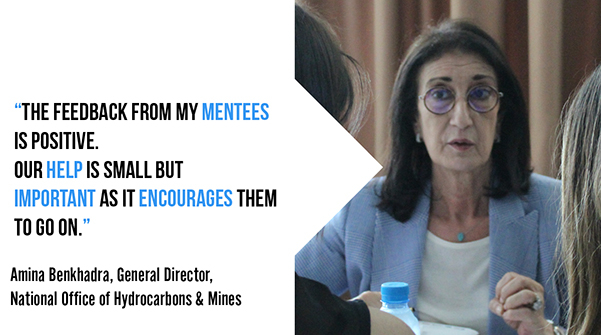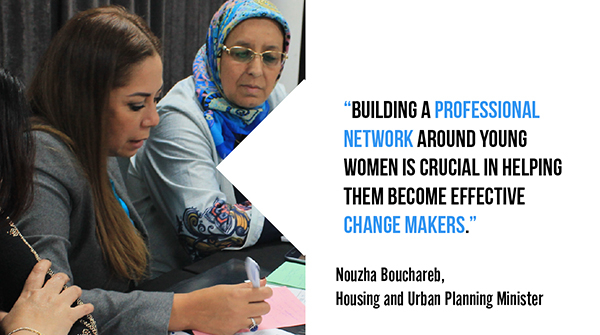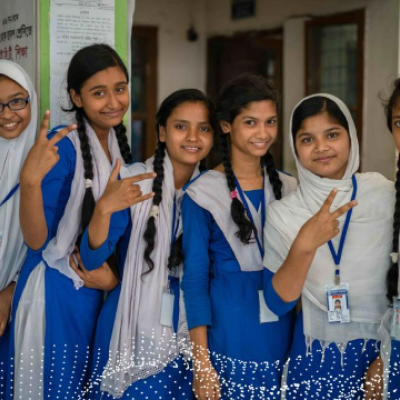Political participation and representation of women in Morocco is on the rise. Women’s mobilisation, institutional changes and policy reforms have led to a more inclusive political environment in the past 20 years. However, despite this progress, significant challenges remain.
The EU Gender Action Plan 2016-2020 (GAP II) strengthens the voice and participation of girls and women in partner countries. Since March 2018, the Konrad Adenauer Foundation (KAS), together with the European Network of Political Foundations (ENoP), has been leading a consortium of European and African organisations(1) under this programme. The three-year project 'Get involved! Women empowerment in Morocco and Benin' aims to strengthen women's - especially young women - participation in political parties in these two countries.
- The mentorship component of the “Get involved!” project has proven to be key in the success so far: “There are a lot of business-related mentorship initiatives in Morocco, but few focus on politics,” said Badria Zeino-Mahmalat, KAS project coordinator. The project´s first best practice focuses on “offering direct mentoring opportunities to young women, while sharing tools with political parties to encourage them to better integrate aspiring politicians,” continues Badria Zeino-Mahmalat.
- The project´s two other best practices are its multi-party approach - involving political parties from a wide ideological spectrum, and the inclusion of men in some of the project’s activities, as part and parcel of the societal change towards gender equality.
Developing women’s capacities through mentoring
The mentorship component acts on different levels. It provides both strong female and male role models with experienced leadership skills to motivate and guide young women politicians. It also encourages political parties to reform and create more space to better integrate women.
1) Promoting sustained mentorship
The project has secured the participation of successful and respected female role models, such as Minister Nouzha Bouchareb and former Minister Amina Benkhadra(2), to counter predominant discriminatory norms and conservative social practices against women’s political involvement.

Each mentor is introduced to three female mentees from the same political party, whom the mentor regularly meets and coaches: “The purpose is to strengthen our mentee’s professional network; to discuss the legal framework, the access to financing, and share some of the main barriers that women face in politics,” said Amina Benkhadra.
The project has developed a guidebook on mentoring which has been distributed to political parties with a view to disseminating best practices on sustained mentorship within political parties.
Increasing women’s inclusion in a multi-party approach
Naturally, women have varied political agendas. Yet “…despite our ideological differences, we all work towards a common goal, which is to increase women’s access to political institutions, and to institutionalise gender equality,” said Nouzha Bouchareb, “therefore, the project invited all political groups to join their activities(3)”, with many having indeed joined the initiative.
2) Institutionalising gender equality within party structures
Technical assistance is organised by the “Get involved!” project on several specific topics, such as programme drafting and recruitment. Experts meet political parties individually to discuss how their internal rules and procedures could be more conducive to laying the basis for equal access of men and women at all levels of the political parties, including senior positions.

Moreover, inspired by comparative case studies, the project discussed with each party best practices and procedures for drafting gender-sensitive political programmes and manifestos(4).
Recruitment policies of members is another key element that can play a role in reaching equal access within party structures. One option identified during project discussions included using more gender neutral or inclusive language in relevant documents and texts. Another interesting option is to systematically organise welcoming and induction courses for new women members.
Men as ‘champions’ of women´s rights
Among the deterring factors often mentioned by women preventing them from starting a political career, are domestic responsibilities, conservative cultural attitudes to the role of women in society, and the lack of family support and encouragement.
3) Promoting equal rights and opportunities
A combination of both mixed-gender activities and ‘women-only’ training sessions are organised by the project to address different objectives. Senior male political leaders, for instance, are invited to join gender-equality awareness-raising workshops to discuss the benefits of women’s equal political participation and representation. “We have already noticed behavioural changes regarding the way male politicians are discussing and addressing women’s issues in politics,” said Badria Zeino-Mahmalat.
The “Get Involved!” project is a promising initiative in a context of structural barriers that limit women’s autonomy and action. As Minister Bouchareb said: “this initiative has only one pitfall, it should have a longer lifetime.”
The following video presents the key activities of the project 'Get involved' and shares insights from the project coordinator and two or the project mentors.
|
ABOUT GET INVOLVED The project “Get involved! Women empowerment in Morocco and Benin” is one of five projects awarded under a Global Call for Proposals launched in 2017 as a "Pilot Programme to Strengthen Political Parties". This programme was funded under the European Instrument for Democracy and Human Rights (EIDHR) with a total budget of EUR 5 million. The overall objective of the programme is to support representative democracy and political pluralism through the bolstering of political parties, in line with a multiparty, non-partisan approach. The call had two specific objectives. The first was to strengthen the role of women in political party life, focusing on empowering young women in particular to take an active role in the life of political parties and in political affairs in general. Three projects were awarded to contribute to this objective: “Get involved! Women empowerment in Morocco and Benin”, “Young Women in Active Politics (YAP)” in Malawi and” Strengthening Parity Democracy in Political Parties in Bolivia”. The second objective focused on strengthening multi-party systems, supporting inter-party dialogues to discuss the legal, financial and/or policy framework affecting political parties and political party financing, as well as supporting political parties in improving their governance, transparency, accountability and outreach to citizens (particularly women and youth). Two projects were awarded to contribute to this objective: “Level Up: Political Finance with Integrity”, implemented by International IDEA and “REACH for Democracy” - Regional Engagement to Advance the Creation of Hubs for Democracy”, implemented by the Netherlands Institute for Multi-party Democracy (NIMD). |
(4) Case studies from other countries included Germany, Rwanda and Tunisia.
Credit: Videos © Capacity4dev | Photo ©Konrad Adenauer Foundation - Morocco




Comments
Log in with your EU Login account to post or comment on the platform.